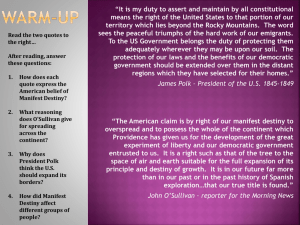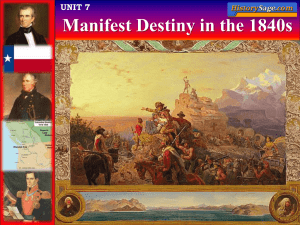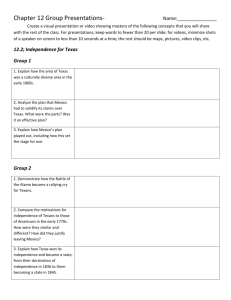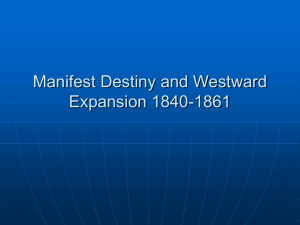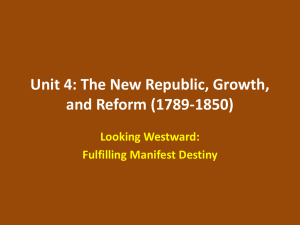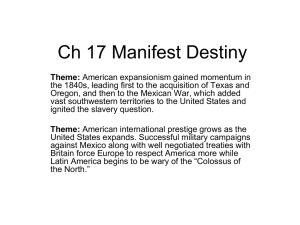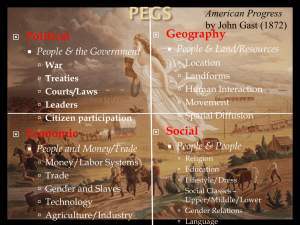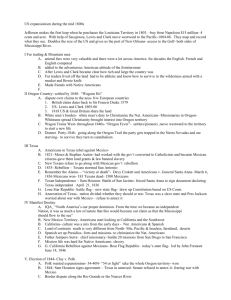HistorySage - Dover Union Free School District
advertisement
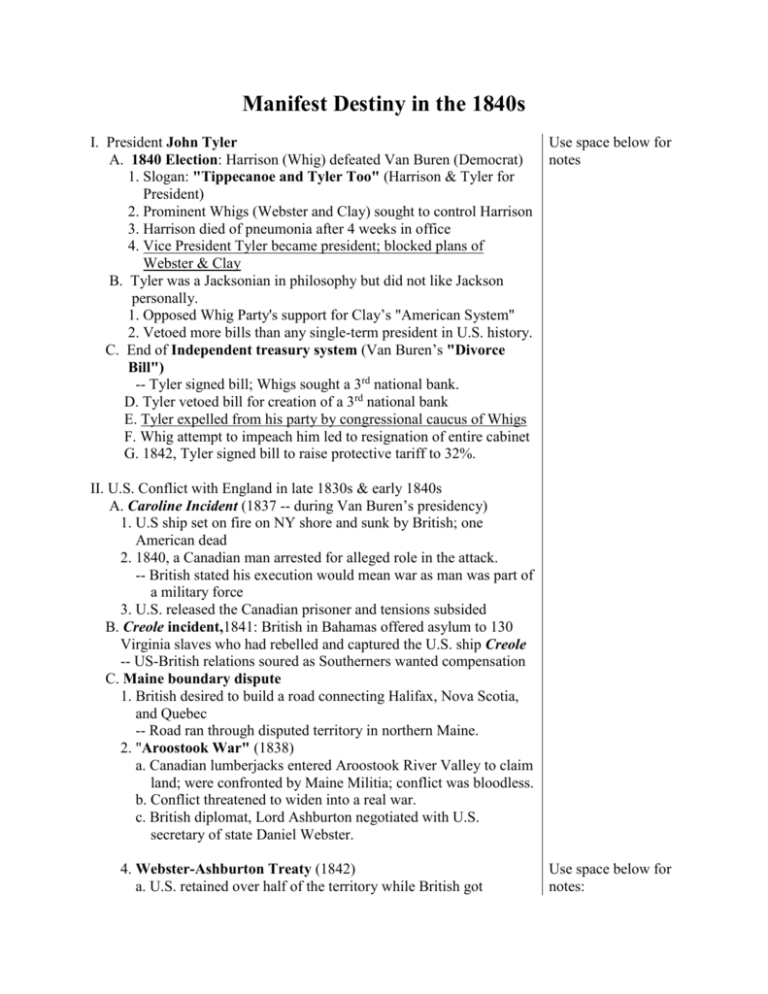
Manifest Destiny in the 1840s I. President John Tyler A. 1840 Election: Harrison (Whig) defeated Van Buren (Democrat) 1. Slogan: "Tippecanoe and Tyler Too" (Harrison & Tyler for President) 2. Prominent Whigs (Webster and Clay) sought to control Harrison 3. Harrison died of pneumonia after 4 weeks in office 4. Vice President Tyler became president; blocked plans of Webster & Clay B. Tyler was a Jacksonian in philosophy but did not like Jackson personally. 1. Opposed Whig Party's support for Clay’s "American System" 2. Vetoed more bills than any single-term president in U.S. history. C. End of Independent treasury system (Van Buren’s "Divorce Bill") -- Tyler signed bill; Whigs sought a 3rd national bank. D. Tyler vetoed bill for creation of a 3rd national bank E. Tyler expelled from his party by congressional caucus of Whigs F. Whig attempt to impeach him led to resignation of entire cabinet G. 1842, Tyler signed bill to raise protective tariff to 32%. Use space below for notes II. U.S. Conflict with England in late 1830s & early 1840s A. Caroline Incident (1837 -- during Van Buren’s presidency) 1. U.S ship set on fire on NY shore and sunk by British; one American dead 2. 1840, a Canadian man arrested for alleged role in the attack. -- British stated his execution would mean war as man was part of a military force 3. U.S. released the Canadian prisoner and tensions subsided B. Creole incident,1841: British in Bahamas offered asylum to 130 Virginia slaves who had rebelled and captured the U.S. ship Creole -- US-British relations soured as Southerners wanted compensation C. Maine boundary dispute 1. British desired to build a road connecting Halifax, Nova Scotia, and Quebec -- Road ran through disputed territory in northern Maine. 2. "Aroostook War" (1838) a. Canadian lumberjacks entered Aroostook River Valley to claim land; were confronted by Maine Militia; conflict was bloodless. b. Conflict threatened to widen into a real war. c. British diplomat, Lord Ashburton negotiated with U.S. secretary of state Daniel Webster. 4. Webster-Ashburton Treaty (1842) a. U.S. retained over half of the territory while British got Use space below for notes: HistorySage.com APUSH Lecture Notes Unit 7: Manifest Destiny Page 2 Halifax-Quebec route b. British expressed regret for destruction of Caroline c. British promised to avoid interference in freeing slaves (as in Creole incident) d. Both agreed to cooperate in patrolling African coast to prevent smuggling e. U.S. gained land in Minnesota (later, valuable iron ore discovered there) f. Significance: improved U.S.-British relations. III. Manifest Destiny A. Millions of Americans in 1840s & 50s believed that God chose Americans to control of the Western Hemisphere. 1. Felt mission was to spread democratic institutions from "sea to shining sea." 2. Land greed and ideals joined into a potent mix for expansion 3. Thomas Hart Benton -- leading proponent of expansionism, free land, and internal improvements. 4. "Manifest destiny" phrase coined in 1844 by John L. Sullivan 5. Movement really began in 1830s with Jackson & Van Buren removing Indians B. Election of 1844 an expression of Manifest Destiny 1. Expansionist Democrats supported "Young Hickory" James K. Polk a. Historians often extend "Jacksonian Democracy" through Polk's presidency b. Sought to annex Texas & gain Oregon up to the 54-40 parallel. 2. Clay’s attempt to straddle the Texas issue cost him the presidency 3. Liberty Party: 1st party created for the anti-extension of slavery a. Candidate: James G. Birney, founder of Kentucky Anti-Slavery Society b. Party ran in both 1840 and 1844 elections. 4. Polk d. Clay 170-105 (Clay lost NY by 5K votes; that was the difference) 5. Democrats claimed mandate for annexation; moot when Tyler’s annexed Texas C. Polk’s 4-point program (achieved in less than four years) 1. Lowered tariff of 1842 from 32% to 25% (Walker Tariff, 1846) -- Proved to be excellent revenue producer as it was followed by boom times. 2. Restoration of the Independent Treasury System (1846) Use space below for notes: HistorySage.com APUSH Lecture Notes Unit 7: Manifest Destiny Page 3 3. Acquisition of California 4. Settlement of the Oregon dispute IV. Oregon Treaty (1846) A. Region had been disputed in certain sections by Spain, Russia, Britain, & U.S. 1. John Jacob Astor: Developed the American Fur Company into a huge enterprise organizing the fur trade from the Great Lakes to Oregon. -- When Astor died in 1848, he was the richest man in America 2. Spain gave away claims to Oregon in Florida Purchase Treaty, 1819 3. Conflict with Russia a. Fort Ross established by Russia in 1812 just north of San Francisco b. Monroe Doctrine intended by J. Q. Adams partly to reject Russian claims. c. Russia retreated to 54-40’ line due to 1824-25 treaties with U.S. & Britain -- U.S. & Br. became sole possessors. B. American migration into Oregon region (south of Columbia River) 1. Oregon Trail: 1840’s: flood of pioneers with came to Oregon on a trail blazed by Jedediah Smith. a. 2,000 mile trail; average of 17 deaths per mile for pioneers -- Trail began at Independence, Missouri or Council Bluffs, Iowa b. By 1846, 5,000 U.S. settlers lived south of Columbia River; British had only 700 people living north of river C. British concerned about large U.S. migration into the region 1. Disputed area between Columbia River and 49th parallel. -- Proposed compromise of 49th parallel initially refused by Britain 2. Polk abandoned campaign pledge of a 54-40 boundary: "54-40 or fight!" a. Didn't want to tip north-south political balance with new additional northern states. b. Southerners, happy with Texas annexation & election, accepted the 49th parallel 3. Early in 1846, Britain agreed to 49th parallel D. Oregon Treaty: U.S. received Oregon territory south of 49th parallel 1. War with Mexico influenced many Senators to seek a quick end Use space below for notes HistorySage.com APUSH Lecture Notes Unit 7: Manifest Destiny Page 4 to dispute 2. Northwestern states angry that Southerners got all of Texas but U.S. did not get all of Oregon. V. Texas joins the Union A. Republic of Texas lasted 9 years 1. Mexico had refused to recognize Texas independence since 1836. a. Threatened war if U.S. should try annexation b. Vastly outnumbered Texans feared Mexico 2. Texas signed treaties England, France, & Holland for protection in 1839-1840. a. British interested in Texas as buffer zone against further U.S. expansion. -- Area could be used for European challenge to Monroe Doctrine b. France also hoped to divide North America. B. Texas became the leading issue in 1844 campaign (Polk v. Clay) 1. Opponents feared expansion of slavery into new region. 2. Southerners strongly supported annexation C. 1845, Tyler got joint resolution in Congress for annexation (required only majority) 1. Didn't push for a treaty as it required 2/3 vote in Senate; many Whigs opposed. 2. Lame-duck Tyler interpreted (narrow) election as mandate for annexation. D. Mexico claimed U.S. had unjustly taken Texas; refused to recognize annexation VI. Mexican War A. Polk sought to buy California from Mexico; Mexico not interested 1. California was seen as gateway to the Pacific 2. Texas’ annexation issue caused Mexico to sever diplomatic relations with U.S. 3. Boundary dispute: Original boundary was the northerly Nueces River; Texans claimed the Rio Grande to the South a. Polk honored Texas’ boundary b. Mexicans less concerned over boundary, wanted Texas back 4. U.S. claimed against Mexico $3 million in damages to U.S. citizens & property -- Mexico had formally agreed to assume this debt but defaulted 5. Polk sent John Slidell to Mexico City in late 1845 to buy California for $25 mil -- Mexico refused to allow Slidell to present his proposition Use space below for notes: HistorySage.com APUSH Lecture Notes Unit 7: Manifest Destiny Page 5 B. Declaration of War 1. Jan. 1846, Polk ordered Gen. Zachary Taylor to march from Nueces River to Rio Grande, and ordered Navy in Gulf of Mexico and California coast to be ready. -- Polk was prepared to force a showdown but none occurred 2. April, Mexican troops crossed Rio Grande and attacked Taylor; 16 casualties (11 killed) a. Polk sent war message to Congress b. Congress overwhelmingly voted for declaration of war. -- Even antislavery Whigs joined in; later condemned war as "Mr. Polk’s War" c. A majority of Whigs opposed the war in principle. i. Some Whigs questioned if the war had begun on U.S. territory -- Spot Resolutions: Rep. Abraham Lincoln sought the exact "spot" ii. Many Whigs believed U.S. had no legal right to land south of Nueces River. iii. Ralph Waldo Emerson feared slavery issue in new conquered territories would lead to a severe sectional crisis: "Mexico will poison us!" d. Southern expansionists eager to take more Mexican territory. 4. Mexico hoped U.S. involvement with Britain over Oregon would erupt into war -- Wanted to humiliate U.S. for Texas issue C. U.S. initiated 3-pronged attack; Polk sought a limited war 1. California by land a. Capt. John C. Fremont captured California, after the state had earlier won its independence in the Bear Flag Revolt b. 1846, Gen. Stephen W. Kearny captured Santa Fe and moved into California 2. California by sea -- Commodore John D. Sloat seized Monterey & San Francisco. 3. Gen. Zachary Taylor victorious at Monterey and Buena Vista -- Taylor an overnight hero (became president in 1848) 4. Gen. Winfield Scott pushed inland from Vera Cruz and captured Mexico City. -- Mexico still refused to negotiate and instead carried on guerrilla warfare. D. Treaty of Guadalupe Hidalgo (Feb.2, 1848) 1. Nicholas Trist negotiated treaty with Mexico despite being recalled by Polk for bungling a deal (bribe) with Santa Anna who took the money and ran Use space below for notes HistorySage.com APUSH Lecture Notes Unit 7: Manifest Destiny Page 6 2. Provisions: a. U.S. gained California, and modern-day NM, AZ, UT and NV -- ½ of Mexican territory b. U.S. to pay $15 million and assumed claims of U.S. citizens against Mexico of $3,250,000 3. Treaty approved by Senate 38-14 despite bitter debate a. "Mexican Whigs" disapproved of war & even threatened to cut off supplies to U.S. forces in Mexico; b. Expansionists in South clamored for all of Mexico c. Calhoun pushed for treaty immediately before significant opposition mounted. E. Results of Mexican War 1. Most significantly, slavery issue aroused: Slavery or not in new territories? a. In a broad sense, Mexican War resulted in Civil War b. Abolitionists saw Mexican War as conspiracy of southern slave owners. c. Wilmot Proviso, 1848 i. Slavery should never exist in any of territory gained from Mexico ii. Twice passed House but not Senate; endorsed by all but 1 free state iii. Southerners resented Northern attempts to prevent expansion of slavery 2. U.S. territory increased by 1/3 (including Texas); bigger than Louisiana Purchase 3. 13,000 Americans dead, mostly by disease. 4. Sentiment for Manifest Destiny increased in U.S. 5. Latin America began to negatively view U.S. as the "Colossus of the North" 6. U.S. forces experienced in war; would effect scope of Civil War Questions for Review: 1. Analyze several factors that led to American expansion in the 1840s. 2. To what extent did American expansionists achieve their goals between 1840 and 1848? 3. Compare and contrast American expansionism during “Manifest Destiny” in the 1840s with expansionism in the years between 1800 and 1840. (You may have to review Unit 4). 4. To what extent was President James K. Polk successful in achieving his political goals during his presidency? Use space below for note HistorySage.com APUSH Lecture Notes Unit 7: Manifest Destiny Page 7
